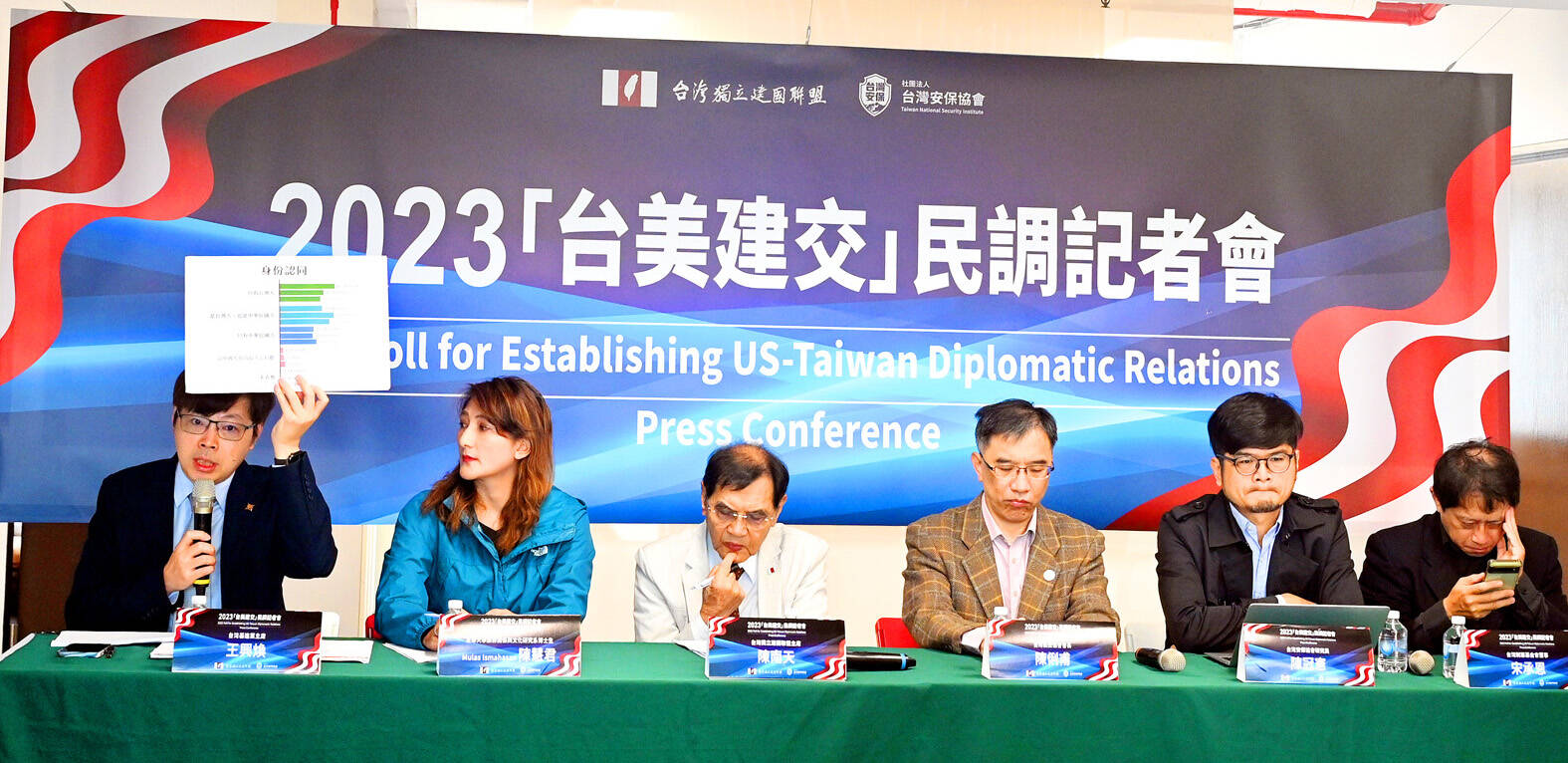Public support for maintaining the “status quo” forever across the Taiwan Strait has been growing over the past three years, a survey released yesterday showed.
Asked about their view on Taiwanese independence or unification with China, 44.3 percent of respondents supported “forever maintaining the status quo,” up from 42 percent and 40.8 percent last year and 2021 respectively, a poll by the World United Formosans for Independence and the Taiwan National Security Association showed.
Only 3.8 percent of respondents supported “independence as soon as possible,” while 0.7 percent supported “unification as soon as possible,” it showed.

Photo: Wang Yi-sung, Taipei Times
The trend suggests that Taiwanese have become “more conservative” amid heightened tensions across the Taiwan Strait and around the world, said Chen Kuan-hsien (陳冠憲), a researcher at the association.
Another 35.8 percent of respondents supported “maintaining the status quo while working toward independence,” down from more than 40 percent in the past two years, while 11.5 percent supported “maintaining the status quo while working toward unification,” an increase from lower than 10 percent in the past two years, it showed.
The results align with changes in respondents’ perceptions about identity — fewer people identified as “only Taiwanese” and more identified themselves as “only citizens of the Republic of China,” Taiwan Statebuilding Party chairman Wang Hsing-huan (王興煥) said.
Taiwan New Constitution Foundation deputy director Sung Cheng-en (宋承恩) warned that China is determined to “take back” Taiwan and is focused on political warfare and propaganda to influence Taiwan’s elections in January.
Beijing’s attempts might include increasing its political and economic pressure on Taiwan and using the Internet to sway public opinion, he said.
China is “nurturing political agents” in Taiwan to help spread US skepticism narratives or rumors that the Taiwanese economy is reliant on China and that China’s system is superior, he said.
Asked whether the government should pro-actively advocate for establishing diplomatic relations with the US, 29.5 percent of respondents strongly agreed, 17.9 percent moderately agreed and 30.5 percent took a neutral stance, the poll showed.
On forming a military alliance with the US, 41.8 percent of respondents strongly agreed, 17.5 percent moderately agreed and 21.3 percent took a neutral stance, it showed.
The Focus Survey Research was commissioned to conduct the survey, collecting 1,084 valid samples from Monday to Wednesday last week, half by landline and half by mobile phone.
It had a confidence level of 95 percent and a margin of error of plus or minus 2.98 percentage points.

Intelligence agents have recorded 510,000 instances of “controversial information” being spread online by the Chinese Communist Party (CCP) so far this year, the National Security Bureau (NSB) said in a report yesterday, as it warned of artificial intelligence (AI) being employed to generate destabilizing misinformation. The bureau submitted a written report to the Legislative Yuan in preparation for National Security Bureau Director-General Tsai Ming-yen’s (蔡明彥) appearance before the Foreign Affairs and National Defense Committee today. The CCP has been using cognitive warfare to divide Taiwanese society by commenting on controversial issues such as Taiwan Semiconductor Manufacturing Co’s (TSMC, 台積電) investments in the

INVESTIGATION: The case is the latest instance of a DPP figure being implicated in an espionage network accused of allegedly leaking information to Chinese intelligence Democratic Progressive Party (DPP) member Ho Jen-chieh (何仁傑) was detained and held incommunicado yesterday on suspicion of spying for China during his tenure as assistant to then-minister of foreign affairs Joseph Wu (吳釗燮). The Taipei District Prosecutors’ Office said Ho was implicated during its investigation into alleged spying activities by former Presidential Office consultant Wu Shang-yu (吳尚雨). Prosecutors said there is reason to believe Ho breached the National Security Act (國家安全法) by leaking classified Ministry of Foreign Affairs information to Chinese intelligence. Following interrogation, prosecutors petitioned the Taipei District Court to detain Ho, citing concerns over potential collusion or tampering of evidence. The

‘COMPREHENSIVE PLAN’: Lin Chia-lung said that the government was ready to talk about a variety of issues, including investment in and purchases from the US The National Stabilization Fund (NSF) yesterday announced that it would step in to staunch stock market losses for the ninth time in the nation’s history. An NSF board meeting, originally scheduled for Monday next week, was moved to yesterday after stocks plummeted in the wake of US President Donald Trump’s announcement of 32 percent tariffs on Taiwan on Wednesday last week. Board members voted to support the stock market with the NT$500 billion (US$15.15 billion) fund, with injections of funds to begin as soon as today. The NSF in 2000 injected NT$120 billion to stabilize stocks, the most ever. The lowest amount it

NEGOTIATIONS: Taiwan has good relations with Washington and the outlook for the negotiations looks promising, Minister of Economic Affairs J.W. Kuo said Taiwan’s GDP growth this year is expected to decrease by 0.43 to 1.61 percentage points due to the effects of US tariffs, National Development Council (NDC) Minister Paul Liu (劉鏡清) said at a meeting of the legislature’s Economics Committee in Taipei yesterday, citing a preliminary estimate by a private research institution. Taiwan’s economy would be significantly affected by the 32 percent “reciprocal” tariffs slapped by the US, which took effect yesterday, Liu said, adding that GDP growth could fall below 3 percent and potentially even dip below 2 percent to 1.53 percent this year. The council has commissioned another institution